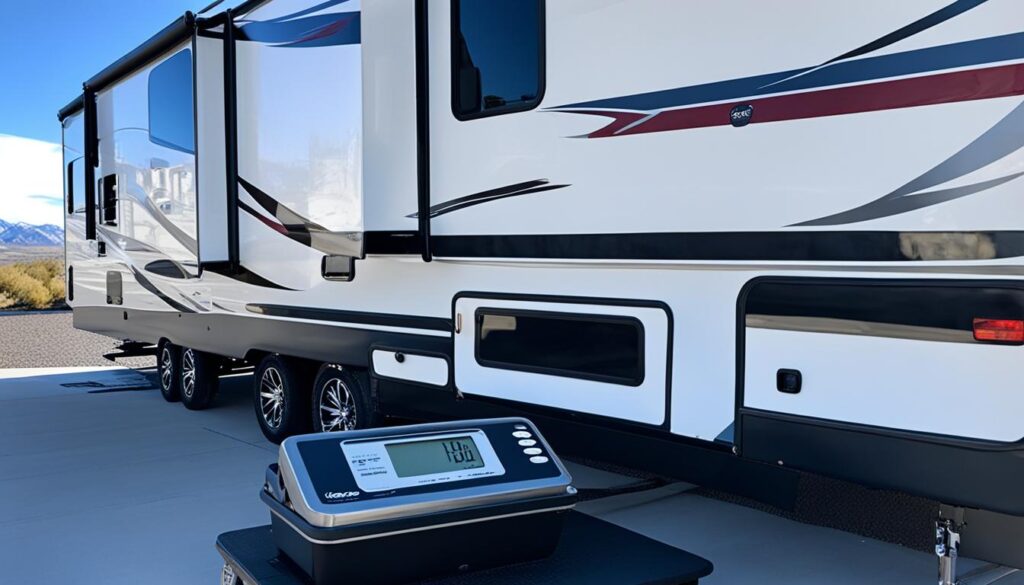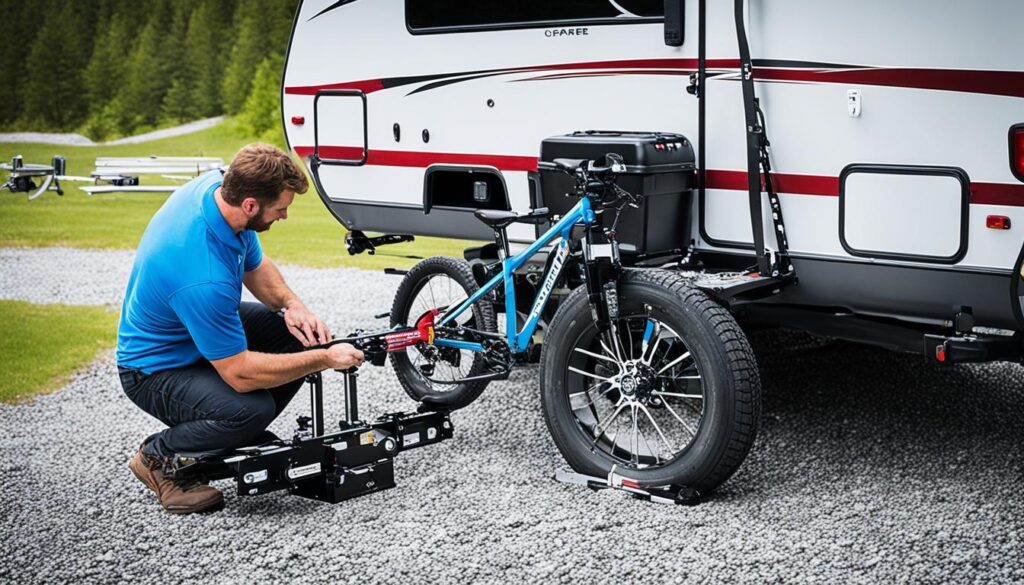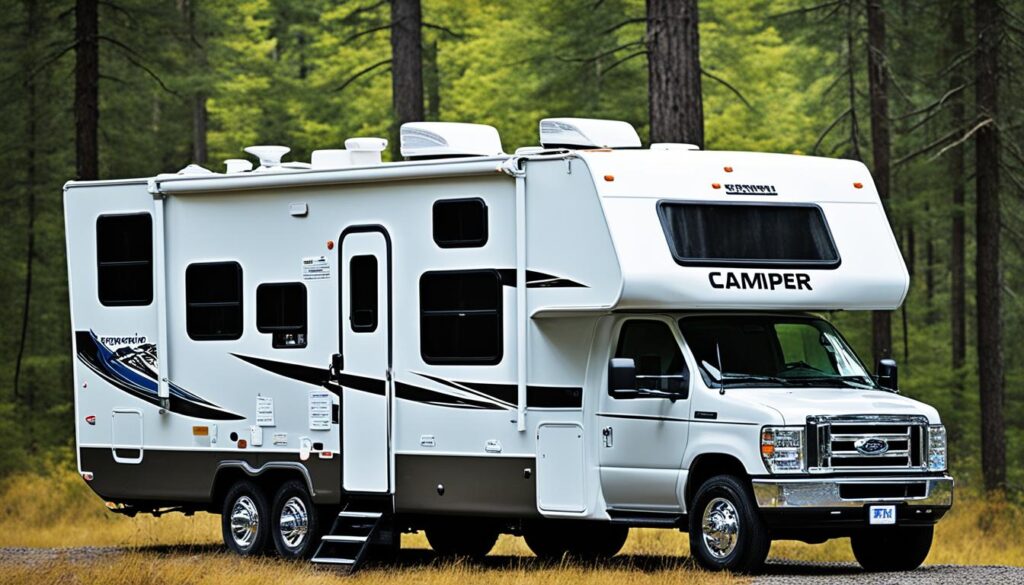Have you ever wondered how the dry weight of a camper can impact its hitch weight and towing capacity? Understanding the relationship between these factors is crucial for safe and efficient towing with a weight distribution hitch. Let’s explore what dry weight really means and why it matters when it comes to hitch weight.
Key Takeaways:
- Dry weight refers to the weight of a camper as shipped from the manufacturer, without any added items or accessories.
- Knowing the dry weight helps you calculate other weights, such as cargo-carrying capacity and passenger-carrying capacity, to stay within safe towing limits.
- Hitch weight, also known as tongue weight, is included in the dry weight and refers to the downward force applied to the hitch of the tow vehicle.
- Gross Vehicle Weight Rating (GVWR) is different from dry weight and includes the maximum allowed weight of the RV with passengers, cargo, fluids, and options.
- You can usually find the dry weight of a camper on a sticker located on the chassis, inside the RV entrance door, or on the manufacturer’s website.
Contents
Why is it Important to Know the Dry Weight of a Camper?
Knowing the dry weight of a camper is crucial for several reasons. It allows you to calculate other weights, such as cargo-carrying capacity and passenger-carrying capacity, to ensure you stay within safe towing limits. An overweight rig can be dangerous and lead to damage to the transmission and suspension components. Understanding the dry weight of your camper is crucial for maintaining the health of your RV and ensuring your safety on the road.
When you have a clear understanding of the dry weight of your camper, you can make informed decisions about how much cargo you can safely carry. Exceeding the towing capacity of your camper can strain the engine and braking system of your tow vehicle, compromising your safety and increasing the risk of accidents.
Additionally, knowing the dry weight of your camper allows you to choose the appropriate weight distribution hitch. A weight distribution hitch helps distribute the weight evenly between the towing vehicle and the trailer, improving stability and control while towing. By selecting the right weight distribution hitch based on the dry weight of your camper, you can maximize safety and minimize the risk of sway or fishtailing during travel.
In summary, having accurate knowledge of the dry weight of your camper is essential for ensuring safe towing, protecting your RV components, and maintaining your overall road safety.
| Benefits of Knowing the Dry Weight of a Camper: |
|---|
| 1. Safety: Understanding the dry weight helps you stay within safe towing limits and prevents overloading, which can lead to accidents. |
| 2. RV Health: By knowing the dry weight, you can prevent damage to transmission and suspension components caused by an overloaded camper. |
| 3. Cargo Management: Accurate knowledge of the dry weight allows you to determine how much cargo you can safely carry without exceeding towing capacity. |
| 4. Weight Distribution Hitch: Choosing the appropriate weight distribution hitch based on the dry weight improves stability and control during towing. |
What Does the Dry Weight of an RV Include?
When it comes to understanding the weight of an RV, the concept of dry weight plays a crucial role. The dry weight of an RV refers to the weight of the vehicle as it is shipped from the manufacturer, without any passengers, cargo, liquids, or additional accessories. It represents the baseline weight of the RV, providing a starting point for calculating towing capacity and cargo carrying capacity.
However, it’s important to note that different manufacturers may have their own definitions of dry weight. While most manufacturers exclude passengers, cargo, and fluids from the dry weight, some may include certain types of optional equipment or exclude specific items. To accurately assess the weight and towing capacity of your RV, it’s essential to understand how the manufacturer calculates the dry weight.
“Understanding the dry weight of your RV is crucial for effective trip planning and safe towing.”
What’s Included in the Dry Weight?
The dry weight typically includes the following components:
- The base structure of the RV
- Exterior features such as windows, doors, and siding
- Electrical systems and wiring
- Plumbing systems and fixtures
- Interior components such as cabinets, furniture, and appliances
- Propane tanks and associated equipment
- Heating and cooling systems
- Roofing materials
- Wheels, tires, and axles
- Other essential components provided by the manufacturer
Keep in mind that optional equipment, such as upgraded appliances, entertainment systems, or additional storage, may not be included in the dry weight. It’s crucial to consult the manufacturer’s specifications or contact a representative for accurate information regarding the inclusion of optional equipment.
To provide you with a better understanding of the factors included in the dry weight of an RV, here’s a breakdown using a hypothetical example:
| Component | Weight (lbs) |
|---|---|
| Base Structure | 5,000 |
| Appliances | 500 |
| Propane Tanks | 100 |
| Electrical System | 200 |
| Plumbing System | 300 |
| Interior Components | 1,000 |
| Exterior Features | 500 |
| Other Components | 500 |
| Total Dry Weight | 8,100 |

Note: The above table provides a hypothetical breakdown of an RV’s dry weight for illustrative purposes only. Actual weights may vary depending on the specific RV model and manufacturer.
Is Hitch Weight Included in Dry Weight of a Camper?
When considering the weight of a camper, it’s essential to understand the various components that contribute to its overall weight. One crucial factor to consider is the hitch weight, also known as tongue weight. This refers to the downward force that the tongue of the trailer applies to the hitch of the tow vehicle.
Hitch weight is indeed included in the dry weight of a camper. Dry weight refers to the weight of the camper as shipped from the manufacturer, without any additional items or accessories. It serves as the baseline weight of the camper before anything is added, including cargo, fluids, or passengers.
Understanding the hitch weight is important for several reasons. Firstly, it helps determine if a tow vehicle is suitable for towing the camper. An acceptable hitch weight typically falls between 10 and 15 percent of the trailer’s total weight. Exceeding this range can lead to instability and unsafe towing conditions.
Additionally, the hitch weight plays a critical role in the selection and utilization of a weight distribution hitch. This type of hitch helps distribute the weight evenly between the tow vehicle and the camper, improving stability and handling on the road. Knowing the hitch weight allows for the proper setup and adjustment of the weight distribution hitch, ensuring safe and controlled towing.
Furthermore, understanding the hitch weight can help determine the compatibility between the tow vehicle and the camper. It is important to ensure that the tow vehicle’s towing capacity can handle the total weight of the camper, including the hitch weight, without exceeding any manufacturer’s limits.

| Dry Weight | Hitch Weight (Tongue Weight) | Weight Distribution Hitch | |
|---|---|---|---|
| Definition | The weight of the camper as shipped from the manufacturer, without additional items or accessories. | The downward force applied by the tongue of the trailer to the hitch of the tow vehicle. | A type of hitch that evenly distributes the weight between the tow vehicle and the camper. |
| Inclusion | Yes | Yes | N/A |
| Purpose | Serves as the baseline weight of the camper before any additions. | Important for determining stability, compatibility, and appropriate weight distribution hitch. | Improves stability, handling, and weight distribution during towing. |
By understanding how the hitch weight contributes to the dry weight of a camper, you can make informed decisions when it comes to towing, ensuring the safety and stability of your tow vehicle and RV combination. Always consult your camper’s specifications and the manufacturer’s recommendations to ensure you stay within safe limits and maintain optimal towing conditions.
Is GVWR the Same as Dry Weight?
Understanding the difference between GVWR (Gross Vehicle Weight Rating) and dry weight is crucial when it comes to determining the towing capacity and cargo carrying capacity of your RV. While these two weight ratings may sound similar, they actually represent different aspects of your vehicle’s weight and capabilities.
GVWR:
The GVWR refers to the maximum allowed weight of your RV, taking into consideration all the passengers, cargo, fluids, and options. It represents the total weight that your vehicle can safely carry, including everything inside and onboard. The GVWR accounts for the structural strength, suspension components, and braking capabilities of your RV.
Dry Weight:
On the other hand, the dry weight of your RV represents its weight as shipped from the manufacturer, without any additional items or accessories. It does not include cargo, fluids, or passengers. The dry weight represents the baseline weight of your RV, providing a starting point for calculating the overall weight that your vehicle can handle.
The Key Differences:
The main difference between GVWR and dry weight is that GVWR includes everything loaded onto and inside your RV, while dry weight only includes the vehicle itself without any added weight. GVWR takes into account the maximum weight that your RV can safely handle, whereas dry weight is merely a starting point for understanding your vehicle’s capabilities.
Implications for Towing Capacity and Cargo Carrying Capacity:
Knowing the difference between GVWR and dry weight is essential for determining the towing capacity and cargo carrying capacity of your RV. The towing capacity refers to the maximum weight that your RV can safely tow, while the cargo carrying capacity represents the amount of additional weight that your RV can handle. By subtracting the dry weight from the GVWR, you can gauge the amount of cargo weight that your RV can accommodate without exceeding its limits. This calculation ensures that you stay within the recommended weight ratings and maintain optimal safety on the road.
How Do You Find the Dry Weight of a Camper?
When it comes to determining the dry weight of your camper, there are a few places you can look for this important information. One common location is on a sticker that is typically located on the chassis of the camper. This sticker provides various details about the vehicle, including its dry weight.
Another place to find the dry weight is inside the door to the entrance of the RV. Many manufacturers place a sticker here that lists important specifications, such as the dry weight.
If you’re unable to locate the dry weight on the chassis or inside the door, you can also check storage areas or cabinets within the camper. Manufacturers often place stickers with important information in these areas as well.
In addition to these physical locations, some camper manufacturers provide the dry weight information on their websites. It’s worth checking the manufacturer’s website to see if they have this information readily available.
However, if you are having difficulty finding the dry weight posted anywhere or online, don’t hesitate to reach out to the manufacturer or your RV dealer directly. They will have access to the necessary information and can help you accurately assess the weight and towing capacity of your camper.
FAQ
What is dry weight on a camper and how does it affect hitch weight?
Dry weight refers to the weight of the camper as shipped from the manufacturer without any additional items or accessories. It does not include passengers, cargo, liquids, or optional equipment. Understanding the relationship between dry weight and hitch weight is essential for safe and efficient towing with a weight distribution hitch.
Why is it important to know the dry weight of a camper?
Knowing the dry weight of a camper is important for several reasons. It allows you to calculate other weights, such as cargo-carrying capacity and passenger-carrying capacity, to ensure you stay within safe towing limits. An overweight rig can be dangerous and lead to damage to the transmission and suspension components. Understanding the dry weight of your camper is crucial for maintaining the health of your RV and ensuring your safety on the road.
What does the dry weight of an RV include?
The dry weight of an RV includes everything on the rig as shipped from the manufacturer, without any passengers, cargo, liquids, or additional accessories or options. However, different manufacturers may have their own definition of dry weight, which can include certain types of optional equipment or exclude certain items. It is important to understand how the manufacturer of your RV calculates dry weight to accurately assess its weight and towing capacity.
Is hitch weight included in the dry weight of a camper?
Yes, hitch weight (also known as tongue weight) is included in the dry weight of a camper. Hitch weight refers to the downward force that the tongue of the trailer applies to the hitch of the tow vehicle. It is a portion of the total weight of the trailer. An acceptable hitch weight for any trailer is typically between 10 and 15 percent of the trailer weight. Understanding the hitch weight is important for ensuring that your tow vehicle and weight distribution hitch can handle the weight of the trailer.
Is GVWR the same as dry weight?
No, GVWR (Gross Vehicle Weight Rating) and dry weight are two different weight ratings. GVWR is the maximum allowed weight of the RV, including passengers, cargo, fluids, and options. It takes into consideration the structural, suspension, and braking components of the vehicle. Dry weight, on the other hand, is the weight of the vehicle as shipped from the manufacturer, without any additional items or accessories. It does not include cargo, fluids, or passengers. Understanding the difference between GVWR and dry weight is crucial for determining towing capacity and cargo carrying capacity.
How do you find the dry weight of a camper?
The dry weight of a camper can usually be found on a sticker located on the chassis, inside the door to the entrance of the RV, or in a storage area or cabinet. Some manufacturers may also provide this information on their website. If you cannot find the dry weight posted anywhere, you can contact the manufacturer or your RV dealer for the information. It is important to know the dry weight of your camper to accurately assess its weight and towing capacity.






